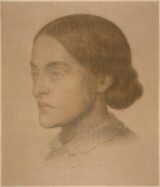
Rossetti, Dante Gabriel (1828-1882) Christina Rossetti c.1866 Coloured chalks on brownish paper, laid down on linen, 48.9 x 43.2 cm Fitzwilliam Museum, Cambridge See also: • Rossetti, Christina (1830-1894)

(1819–1900) The artist’s works: Snow Capped Alps c.1845–1849 Princeton University Art Museum, Princeton Budding Sycamore 1875 Cleveland Museum of Art, Cleveland Head of lake of Geneva s.d. Rijksmuseum, Amsterdam Sketches of a secretary vulture s.d. Princeton University Art Museum, Princeton View of S. Anastasia…